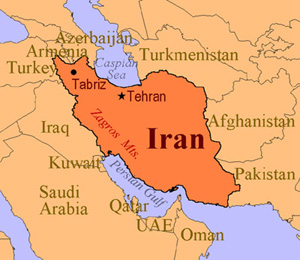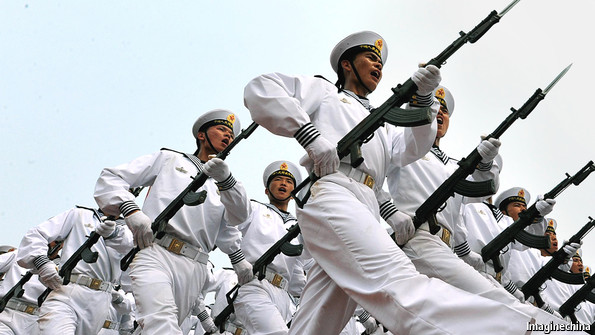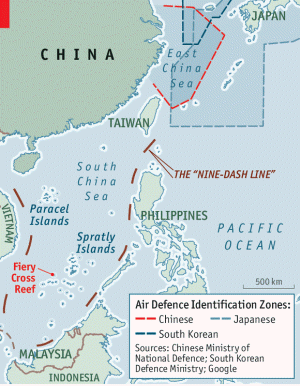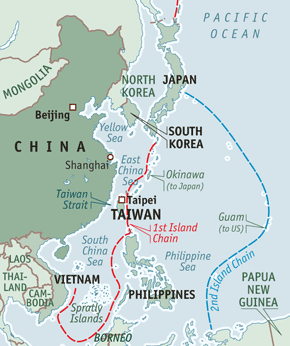China’s Military Buildup:
It’s Aimed at Us
China’s defense budget has for years grown by double-digit percentages as it transforms itself from a land power — although still left with the world’s largest army at 2 million — into a blue water naval power. The West — ever distracted making waves
China is expected to have a navy of 342 ships by 2020. The U.S. fleet numbers 243 surface and submarine warships. Spread thin around the world, only 64 ships are projected to make up our navy’s presence in the China theater. With a production rate five times that of the U.S. and a projected 78 submarines by 2020, the Chinese have opted for the quantitative advantage of cheaper diesel-powered boats. But by 2008 China already had an estimated 30 advanced, partly-stealthy subs and have since sent down the ways their first “boomer” submarine armed with nuclear missiles and having a range of 4500 miles that reach Alaska or Hawaii, and, if launched from out in the Pacific, the continental United States. The Wall Street Journal makes the point that, “China’s boomer patrols will make it one of only three countries — alongside the U.S. and Russia — that can launch atomic weapons from sea, air and land”. Moreover, China has re-engineered its missiles to carry multiple warheads. This step is possibly influenced by the U.S. orienting its missile defense systems toward Asia, although that is to intercept the threat of incoming from North Korea. Nevertheless, Ashley Tellis, at the Carnegie Endowment for International Peace, says it’s notable that China chose to upgrade the particular missiles “that can unambiguously reach the United States”. setting sail
The Chinese navy has begun to roam. By 2008, during the height of Somali piracy, China sent two destroyers to the Gulf of Aden, their first foray of warships to Africa in 600 years. Its navy went to the Mediterranean in 2011 for the first time ever to evacuate Chinese citizens from Libya. “The maritime battlefield has been broadened,” says a Col. Wang Jin, “and China’s navy needs to react to protect its rights globally”. China’s subs have moved away from their coastlines, regularly spotted in the Philippine Sea year round, indicative of their crews learning proficiency in operating away from home. In December 2013, the Chinese sent a nuclear-powered submarine on the surface through the shallow Strait of Malacca, between Malaysia and Indonesia — a major passage for trade — and from there it disappeared until it resurfaced near Sri Lanka and then in the Persian Gulf, returning through the strait in February. It was the first known voyage of a Chinese sub to the Indian Ocean, “proving that it has the endurance to reach the U.S. Pacific Fleet’s headquarters in Hawaii”, said the Journal. This September, pointedly to make a statement while President Obama was in Alaska, it would seem, five ships from the Chinese navy were seen in the international waters of the Bering Sea. projecting power
When Defense Secretary Robert Gates went to China in January, 2011, he was taken by surprise when in a visit to an airfield a radar-evading asymmetrics
There are anguished voices in America that decry how we have allowed our navy to shrink to so few ships. Others call them captives of history who imagine a bygone world in which the outcome of a war could turn on set piece ship-against-ship battles. This is an age of technology in which a shower of the low-cost missiles that China has been developing could send one of our Nimitz class nuclear carriers to the bottom with its 5,000 souls on board and its 90-or-so planes. The Chinese have concentrated on long-range anti-ship missiles. By 2010, a Chinese China has made clear that it intends to resolve sovereignty disputes in its “near seas” — the Yellow, East China and South China Seas — on its own terms. If America’s intentions are to keep the South China Sea open at all costs, the costs may be dear. The Chinese have positioned unknown numbers of ballistic and cruise missiles near the coast to dissuade American or Japanese warships from coming close. Its scores of submarines are meant to overwhelm the U.S. Navy in any defense of Taiwan. China has spent heavily — $100 billion by 2013 in one estimate — to develop cyber-technology and the satellite reconnaissance and communications that will yield the long-range precision targeting it needs to keep America half an ocean away. China has also worked to produce the technology to block American surveillance and communication satellites. It successfully destroyed a satellite in 2007, joining the U.S. and Russia as the only countries able to do so. “This is the first real escalation in the weaponization of space that we’ve seen in 20 years”, Harvard astronomer Jonathan McDowell said at the time. “It ends a long period of restraint”. That capability has progressed with frightening speed. China “will soon be able to destroy every satellite in space”, according to Lt. Gen. Jay Raymond, commander of the 14th Air Force in a speech this year. We have known of this intent for years, while all our attentions have focused on the Middle East. A report to Congress in 2008 told of “writings” by the Chinese military that “emphasize the necessity of ‘destroying, damaging and interfering with the enemy’s reconnaissance/observation and communications satellites’. “ Gen. Wesley Clark wrote in an op-ed article in The New York Timeslast October that a well-placed Chinese associate had told him in 2013 that, “We can see your stealth aircraft”; “we have our own GPS and can shoot down yours”; “we know your technologies from all your companies and from NASA, because Chinese scientists work these for you”; …“Chinese shipyards are working 24 hours a day, seven days a week”; “more than 30 ships were launched between October 2012 and April 2013”; “by 2019 China will have four aircraft carriers deployed.” Curiously, this alarming pronouncement was found only online; it was omitted from the print version of the Times. China’s cyber attacks have repeatedly rummaged through America’s wide-open computer systems to extract at will industrial and military secrets and data on millions of our citizens. Beyond looking for Chinese-Americans that they can enlist as spies, they may be honing their skills for the ultimate goal in a war — to cripple America by shutting down our power grid. So infested are we by China, that a researcher and writer named Peter Fisher, who consults to the Pentagon, warns that in an air war with China, our fighters might be blown out of the sky because of the astonishing revelation that our F-35s run microchips made in China; they could contain baked-in sleeper code. deficiencies
For now, the U.S. is far more powerful, should a fight break out. And there are cracks in China’s military façade. This March, The Wall Street Journal reported that at least 30 generals had fallen in Xi Jinping’s corruption purge revealing “rampant buying and selling of military ranks” that even had unofficial price tags. Ten million yuan would buy a generalship, for example, which tells you that the corruption only begins at that point, because the general would expect to recover the price of his commission and far more. An officer corps stocked with incompetence can obviously affect an army’s ability to fight. Add to that the Chinese army hasn’t fought in a war in over three decades. In the air, the engines on its fighters lack the power of their U.S. counterparts and even those bought from Russia are not as efficient. The western arms embargo enacted after the 1989 Tiananmen Square massacre has held them back. “Western defense firms believe that is why they are often on the receiving end of cyber-attacks” as China probes for ways to steal our designs. At sea, Chinese submarines are noisy and cannot pass through the many straits through which they must pass to reach open ocean without detection. Moreover, those narrow, shallow straits are easily blocked. China’s hardware is good, says Christopher Johnson at the Centre for Strategic and International Studies, but the software needed to target its anti-ship missiles was lacking — at least it was a year and a half ago says this source. They may have a fighter that looks like the F-22 but when they move up to replicating the F-35, the software that makes it so potent will be more than difficult to replicate — that is, if the U.S. can ever learn how to protect its secrets.
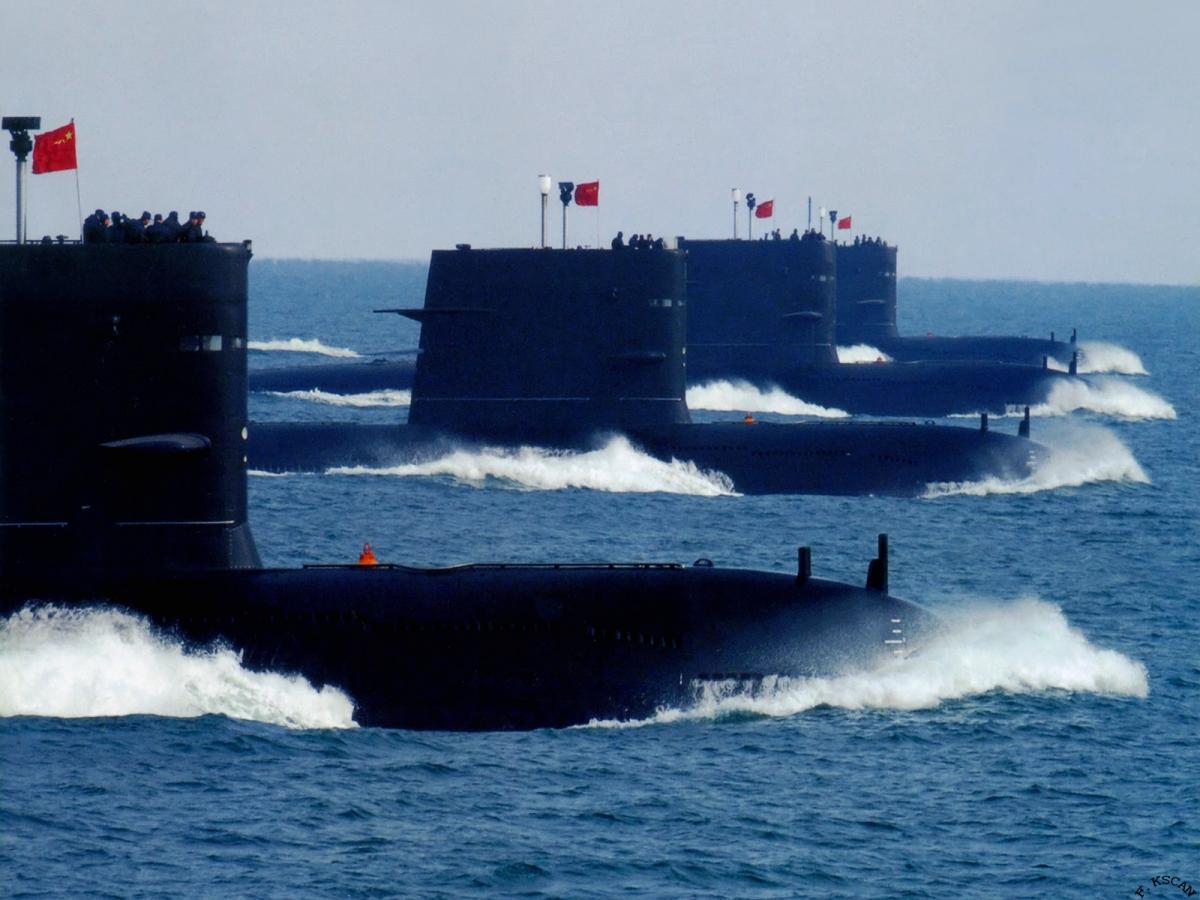
by the Middle East, Central Asia and now, Ukraine — has been left to watch, to the degree that it has been watching at all. Here’s what that transformation has achieved so far:
fighter was rolled out. It even looked much like our own stealth fighter, the F-22 Raptor, with the same twin tailfins. Until then, the U.S. was the only country with operational stealth aircraft. Less than two years later, the Chinese had landed their fighter, the J-15, on the deck of their first aircraft carrier. That ship, the 
China’s first aircraft carrier, named “Liaoning”
Liaoning, was bought from Russia but completely rebuilt by the Chinese, who have said that two more carriers will be completed this year. The J-15 “is considered by many to be somewhat more advanced than our own carrier-based F/A-18E/F Super Hornets”, says a former director of the United States Naval Institute, who goes on to say, “For the last two years Chinese pilots have been practicing carrier-based operations — mainly launches, arrested landings, and safety drills. To watch videos of these drills is to recognize how the Chinese have borrowed from the American instruction manual”. The Chinese recognize that the aircraft carrier allows a navy to project its power however deeply into blue water it chooses to go.
program to pack conventional explosives into a nuclear ballistic missile, converting it into a carrier-killer that would descend from space at hypersonic speed, had reached “initial operational capability”. Other anti-ship missiles can be delivered from aircraft, guided-missile destroyers, fast patrol boats and submarines. We have known for five years of China’s building an anti-ship ballistic missile base in southern China’s Guangdong Province from which its missiles are capable of reaching the Philippines and Vietnam.




